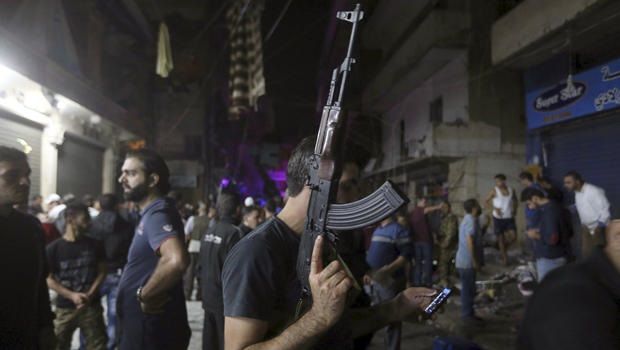
The attack was quickly claimed by the Islamic State of Iraq and Syria, or ISIS, which is fighting in neighboring Syria and Iraq but has not had a recognized affiliate in Lebanon, though the tiny Mediterranean country has seen deadly spillovers from the civil war next door, CBS News wrote.
The explosions hit minutes apart during rush hour in an area of southern Beirut called Burj al-Barajneh, a Hezbollah stronghold. The Shiite group has been fighting in Syria along with Syrian President Bashar Assad's forces. The area has been hit in the past and Sunni militant groups have threatened to carry out more attacks there.
Along with the 43 killed, the bombings also wounded 239 people, the Health Ministry announced.
It was not immediately clear how many attackers were involved. According to a Lebanese security official, the first suicide attacker detonated his explosives vest outside a Shiite mosque, while the second blew himself up inside a nearby bakery.
An apparent third attacker was found dead, his legs blown off while he still wore an intact explosives belt, said the official, speaking to The Associated Press on condition of anonymity in line with regulations. The official speculated that the third man may have been killed from the explosion set off by the second bomber, as he was reportedly close to that blast.
Al-Mayadeen TV also reported there was a third would-be bomber, and showed a video of a bearded young man with an explosives belt. The report said he died before he was able to detonate his explosives.
At the scene of the blasts, residents showed reporters what they said were metal pebbles that are usually put inside an explosives belt to inflict maximum casualties.
"They targeted civilians, worshippers, unarmed people, women and elderly, they only targeted innocent people," Hezbollah official Bilal Farhat told the AP, calling it a "satanic, terrorist attack."
Hospitals in southern Beirut called on people to donate blood and appealed to residents not to gather at hospital gates so that ambulances and emergency staff could work unhindered.
Thursday's attack shattered a period of relative calm in Lebanon. It was the first such large-scale bombing since mid-2014, and comes amid much political upheaval in the country. It was also the deadliest attack in Lebanon since August 23, 2013, when two car bombs exploded outside two Sunni mosques packed with worshippers in the northern city of Tripoli, killing 47 people and wounding hundreds.
Lebanon has been without president for over a year. The country has seen major protests in the past few months over the government's inability to agree on a solution for a festering garbage crisis, and parliament has not functioned properly for years.
As for ISIS, this is the second attack it's claimed so far in Beirut, after a January 2014 bombing in the district of Haret Hreik, also a Shiite neighborhood in the Lebanese capital, according to the U.S.-based SITE Intelligence Group, which tracks militant messaging on the Internet.
Among those killed in Thursday's blasts were two staffers of the American University of Beirut, according to a memo circulated to the AUB community. The memo did not give the names of the staffers or other details, CBS News wrote.

